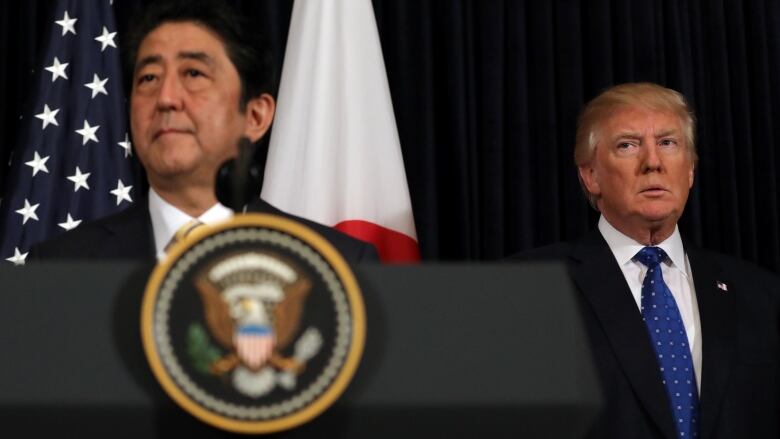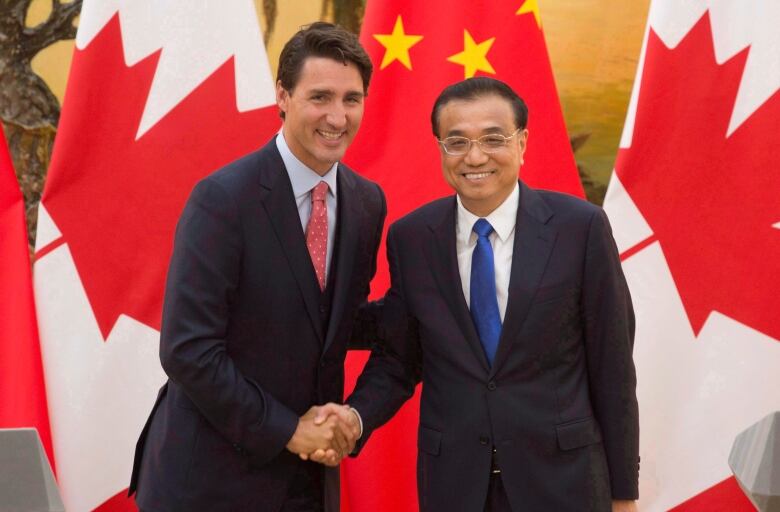'America Last': A dangerous reaction to Trump's trade bullying: Don Pittis
Over-the-top protectionist rhetoric wins few friends among governments or consumers

At first it was easy to discount U.S. President Donald Trump's outrageous comments on trade. They came in the same breath asvowsto build a wall along the entire U.S.-Mexicoborder and remarksabout dating his own daughter.
But now with the planned impositionof dutiesof up to 24per cent on Canadian lumber, Trump has demonstrated to the world that he is not merely raving.
There are growing signs thatthe world is taking Trump's protectionism seriously.
Blame Canada
Canada's government has responded diplomatically, politely disagreeing with the discredited old saw that Canada is dumping softwood onU.S. markets. ButBritish Columbia, whose huge forest industry would be devastated by such aduty,has shot back, demanding a ban on U.S. thermal coal shipments through the province.
Congrats to Mexico on getting Canada to pay for the wall. https://t.co/ObscVHW0uy
—@sdbcraigAs in the past, companies that produce lumber in the U.S. will experience a windfall once the duty is imposed. But it is U.S. consumers who will pay the bill, says Queen's University trade expert Warren Mabee.
Pushing up prices

As fordairy, Mabee says that from Trump's tweets you would never guessCanada is a net importer of dairy products from the U.S.
But of course Canada isn't alone in taking offence from the U.S. president's protectionist tack on trade.
Back when the new president took office, one of his first officialacts was to sign an order pulling the U.S. out of the Trans-Pacific Partnership, calling the move"great news for American workers."
Everyone assumed that was the end of the deal, butJapan's minister of finance Taro Aso has just announced his country willrestart negotiations,leavingthe U.S. out in the cold.
'Minus the U.S.'
"We will start talks on an 11-member TPP, minus the U.S.," said Asoin New Yorklast week.

According to a report yesterday from the Bloombergbusiness news service titled "America's $1.2 Billion Mexico Milk Trade Is Now at Risk," the world's biggest buyer of U.S. milk is looking for new sources, working on a deal with giant milk producer New Zealand and increasing imports from Europe.
"Mexico is looking to make sure they have market alternatives because of the rhetoric from the U.S. on renegotiating NAFTA," a U.S. agriculture andtrade expert told Bloomberg.
Seeking markets outside the U.S.

Canadian international trade analyst Patrick Leblondsays off-the-cuff comments by Trump have an effect, not just on government negotiators but consumers. For example, Trump's grouping energy with milk and timber as areas where Canada is trying to "take advantage" added new enemies.
"It has negative consequences," says Leblond, senior fellow with the Centre for International Governance and Innovation and a professor at the University of Ottawa. "It puts a damper on how people see the U.S. and how they see U.S. products."
He says the impact has already become apparent in the U.S. tourism industry as international travellers look for alternatives to Trump's United States, where minorities feel unwelcome and border guards demand cellphone passwords.
'America Last'
As Trump talks about "America First," consumers might be increasingly tempted to pursue a strategy of "America Last."
Patricia Cormack, an expert in a subject called consumer nationalism and co-author of the book Desiring Canada,says consumers have enormous power.
"The idea of boycotting Trump precedes thesetrade discussions at a more personal level, as all of us are consumers," says Cormack. "We don't need California wine. We've got tons of choices."
Of course in a globalizedworld market, products that seem to be from one country, such as Californiawine,may have inputs from many other countries, including the country doing such boycotting.
Trump's inflammatory and misinformed comments might be useful in softening up the other side in a real estate deal. But if they inspireold friends to develop plans for retaliation against the United States, they could be setting the stage for a trade war that will benefit no one.
Follow Don on Twitter @don_pittis
More analysisfromDon Pittis












_(720p).jpg)


 OFFICIAL HD MUSIC VIDEO.jpg)
.jpg)



























































































